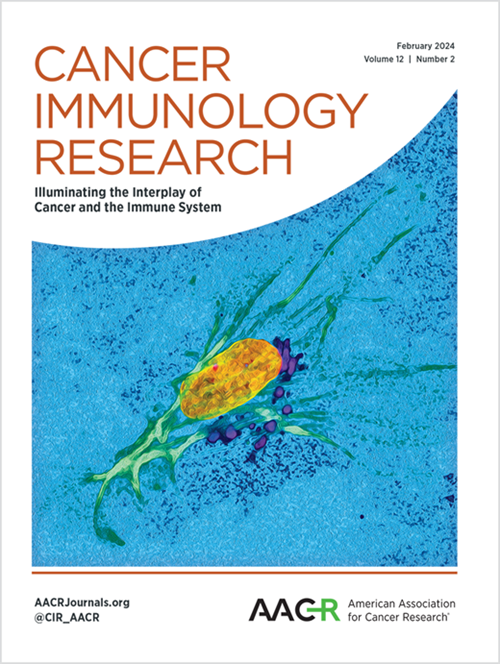BTN2A1:提高人类γδ T 细胞杀伤肿瘤能力的新靶点
IF 8.1
1区 医学
Q1 IMMUNOLOGY
引用次数: 0
摘要
γδT细胞作为癌症免疫疗法的效应细胞,因其不依赖于HLA的作用模式和广泛的肿瘤反应性,最近引起了人们的极大兴趣。要将γδT细胞的应用转化为临床有效的免疫疗法,体内特异性肿瘤靶向和/或增强γδT细胞活化似乎是关键的一步。在本期杂志中,Le Floch 及其同事报告了一种新策略,利用激动剂 BTN2A1 抗体特异性激活γδ T 细胞以杀死急性淋巴细胞白血病细胞和实体瘤细胞。参见 Le Floch 等人的相关文章,第 XX 页。本文章由计算机程序翻译,如有差异,请以英文原文为准。
BTN2A1: A Novel Target to Boost Tumor Killing Capacity of Human γδ T Cells.
γδ T cells have recently raised great interest as effector cells in cancer immunotherapy because of their HLA-independent mode of action and their broad tumor reactivity. To translate the application of γδ T cells into clinically effective immunotherapies, specific tumor targeting and/or boosting of γδ T-cell activation in vivo seem to be a critical step. In this issue, Le Floch and colleagues report a new strategy for enabling γδ T cells to be specifically activated to kill acute lymphoblastic leukemia cells and solid tumor cells using agonistic BTN2A1 antibodies. See related article by Le Floch et al., p. 1677.
求助全文
通过发布文献求助,成功后即可免费获取论文全文。
去求助
来源期刊

Cancer immunology research
ONCOLOGY-IMMUNOLOGY
CiteScore
15.60
自引率
1.00%
发文量
260
期刊介绍:
Cancer Immunology Research publishes exceptional original articles showcasing significant breakthroughs across the spectrum of cancer immunology. From fundamental inquiries into host-tumor interactions to developmental therapeutics, early translational studies, and comprehensive analyses of late-stage clinical trials, the journal provides a comprehensive view of the discipline. In addition to original research, the journal features reviews and opinion pieces of broad significance, fostering cross-disciplinary collaboration within the cancer research community. Serving as a premier resource for immunology knowledge in cancer research, the journal drives deeper insights into the host-tumor relationship, potent cancer treatments, and enhanced clinical outcomes.
Key areas of interest include endogenous antitumor immunity, tumor-promoting inflammation, cancer antigens, vaccines, antibodies, cellular therapy, cytokines, immune regulation, immune suppression, immunomodulatory effects of cancer treatment, emerging technologies, and insightful clinical investigations with immunological implications.
 求助内容:
求助内容: 应助结果提醒方式:
应助结果提醒方式:


